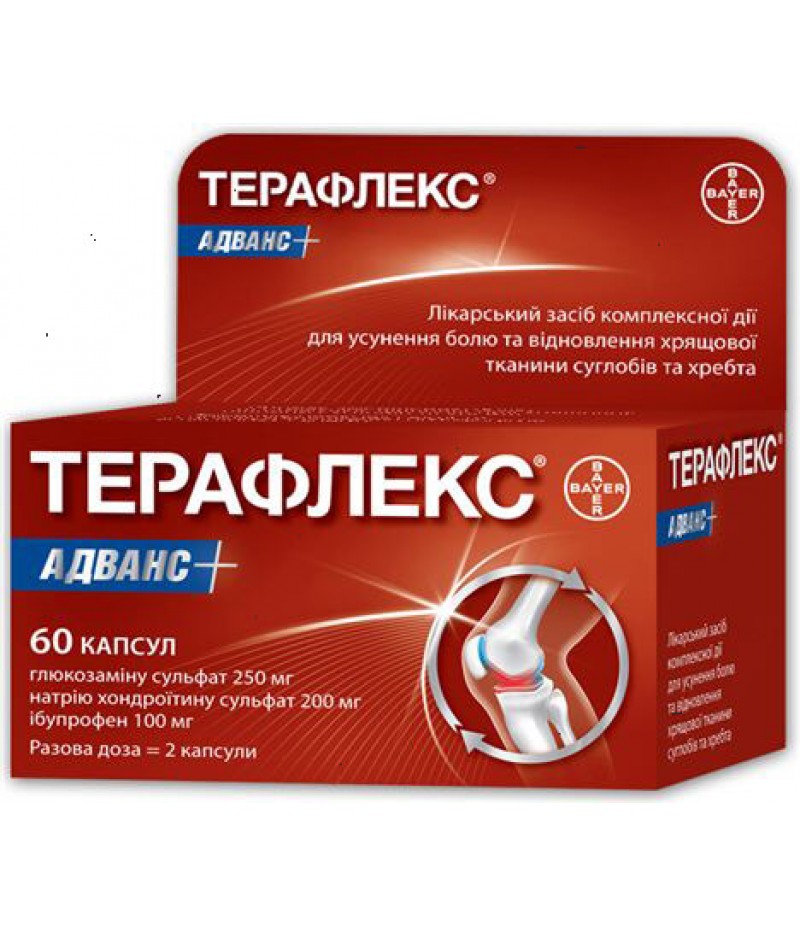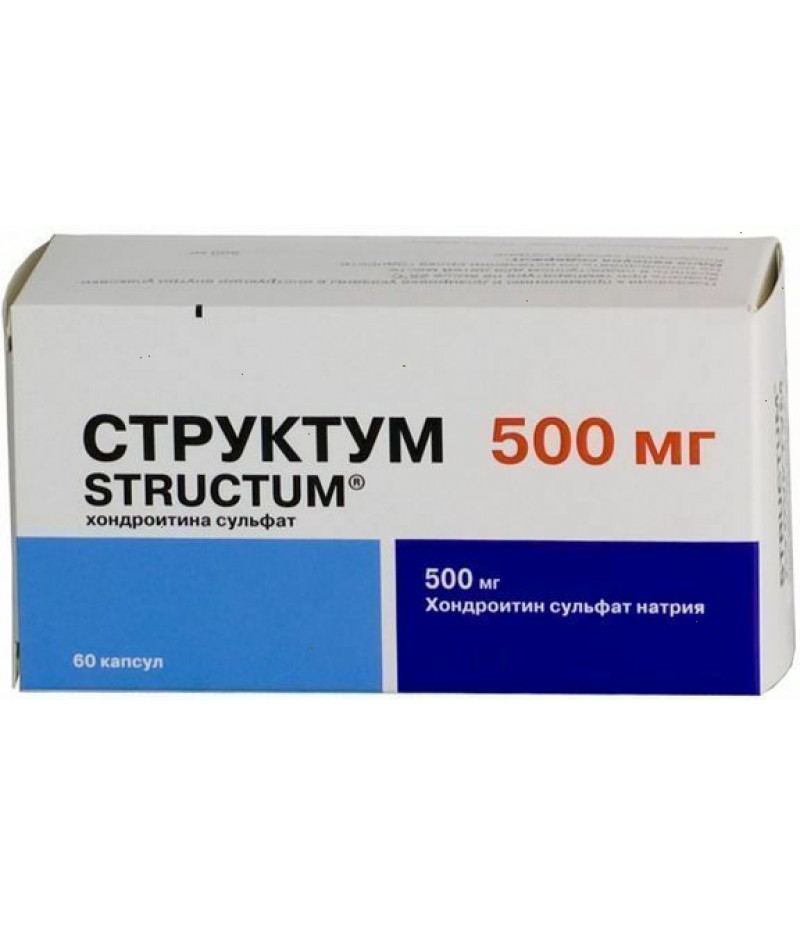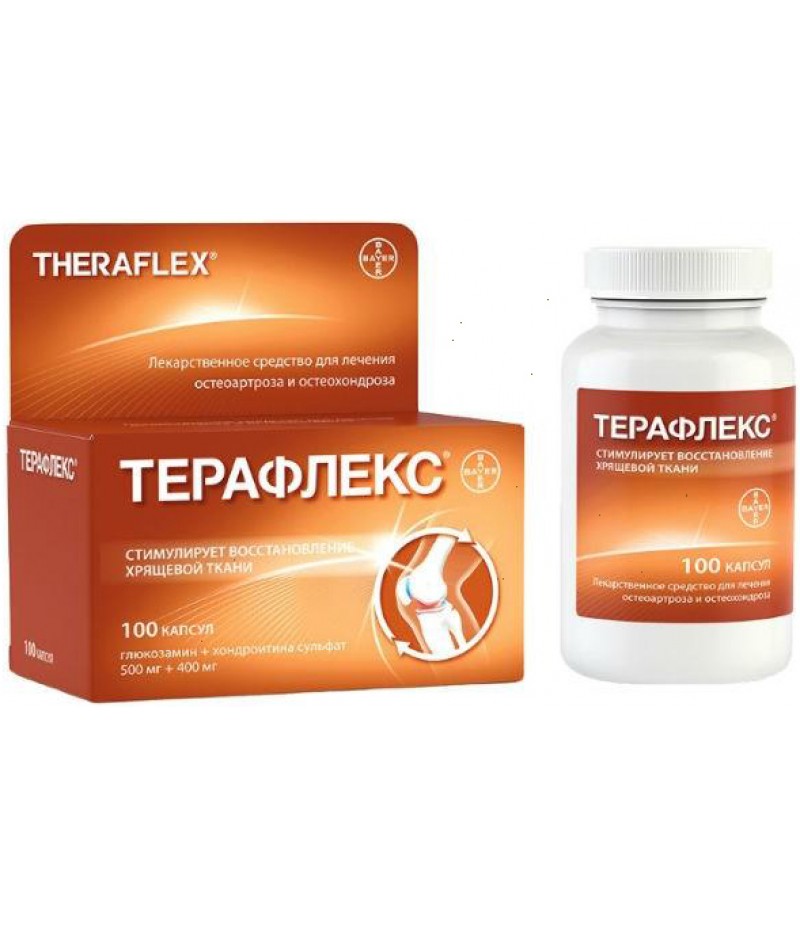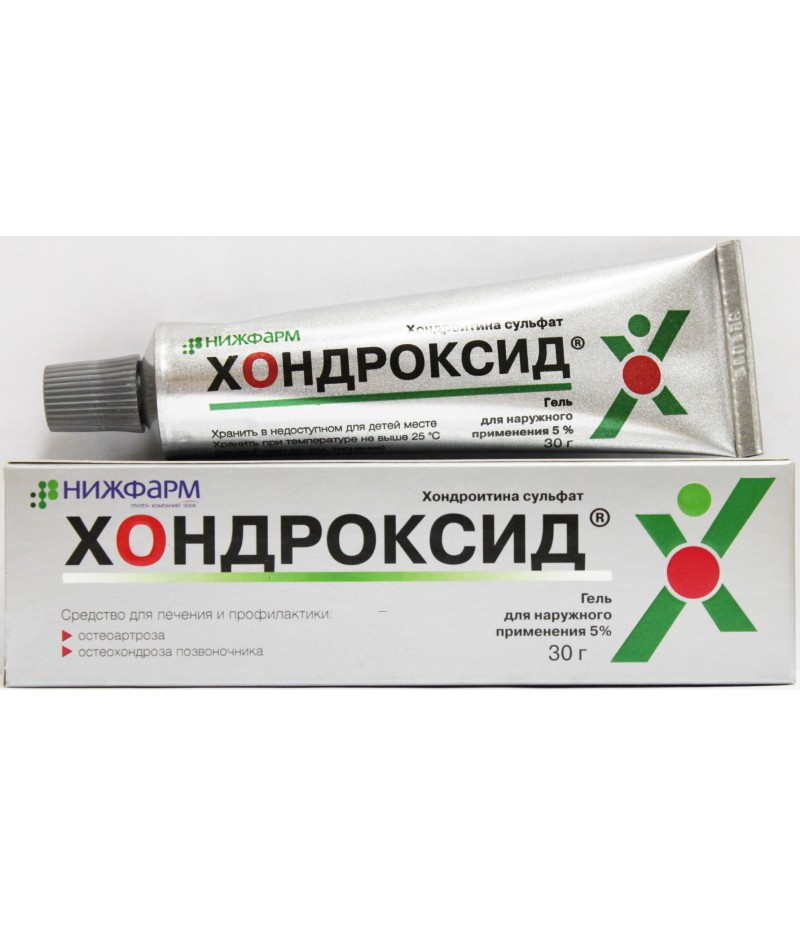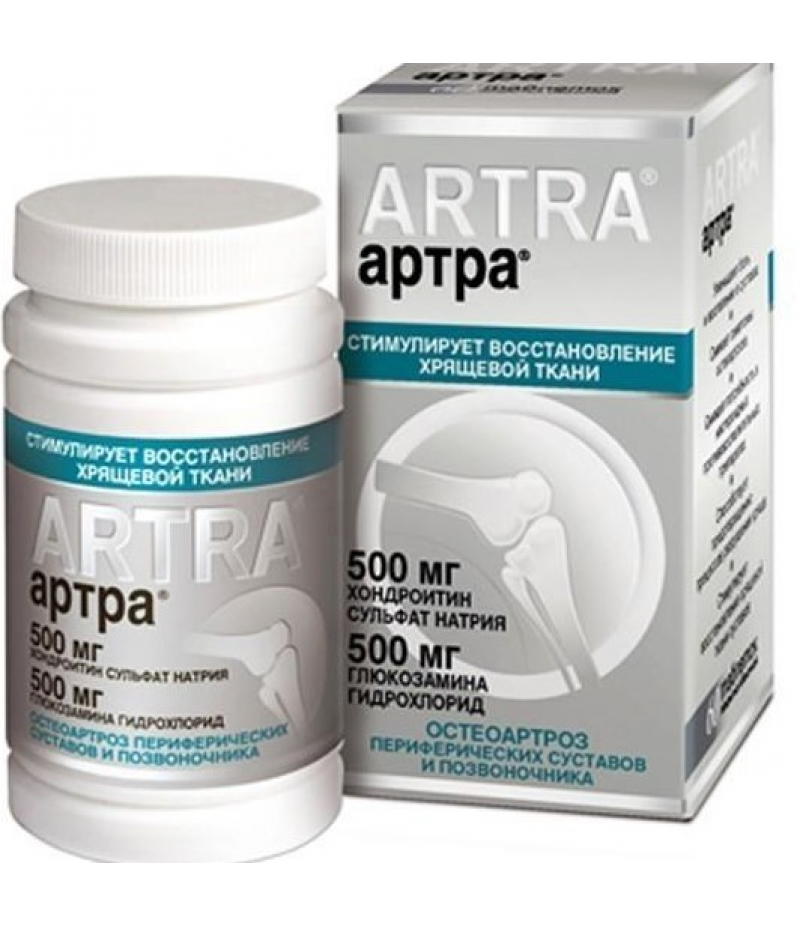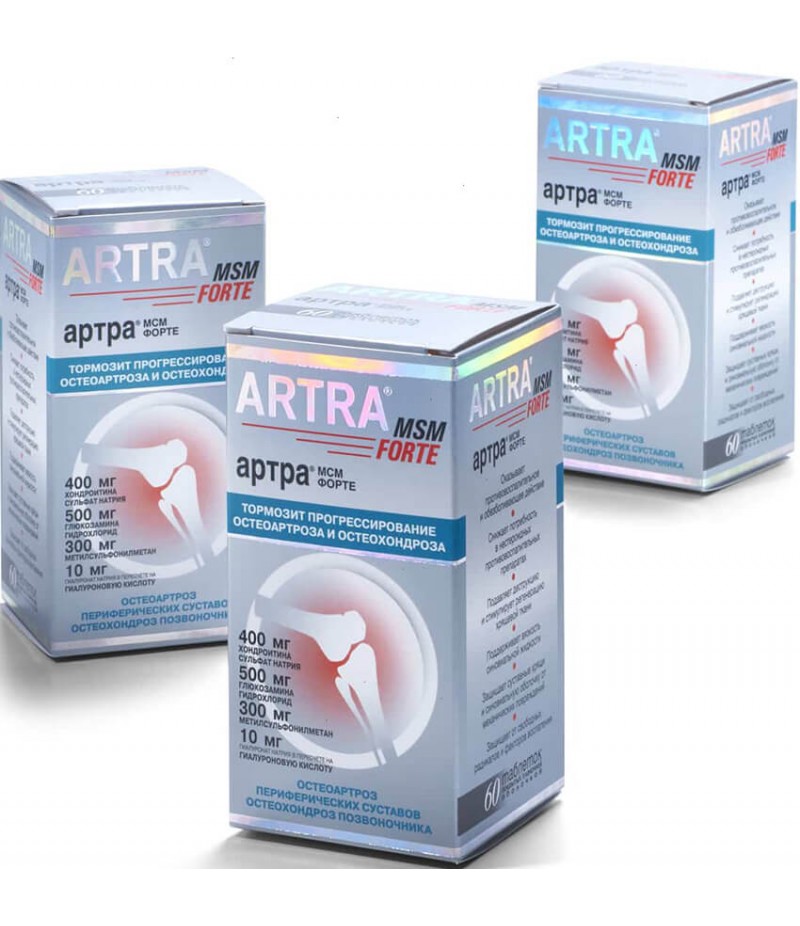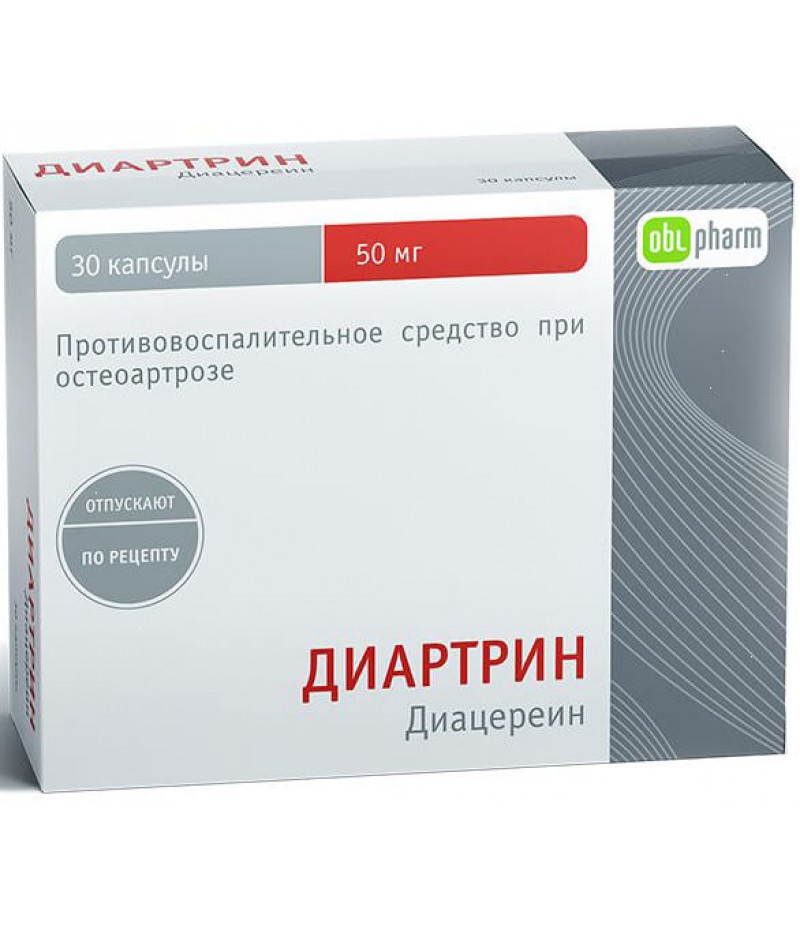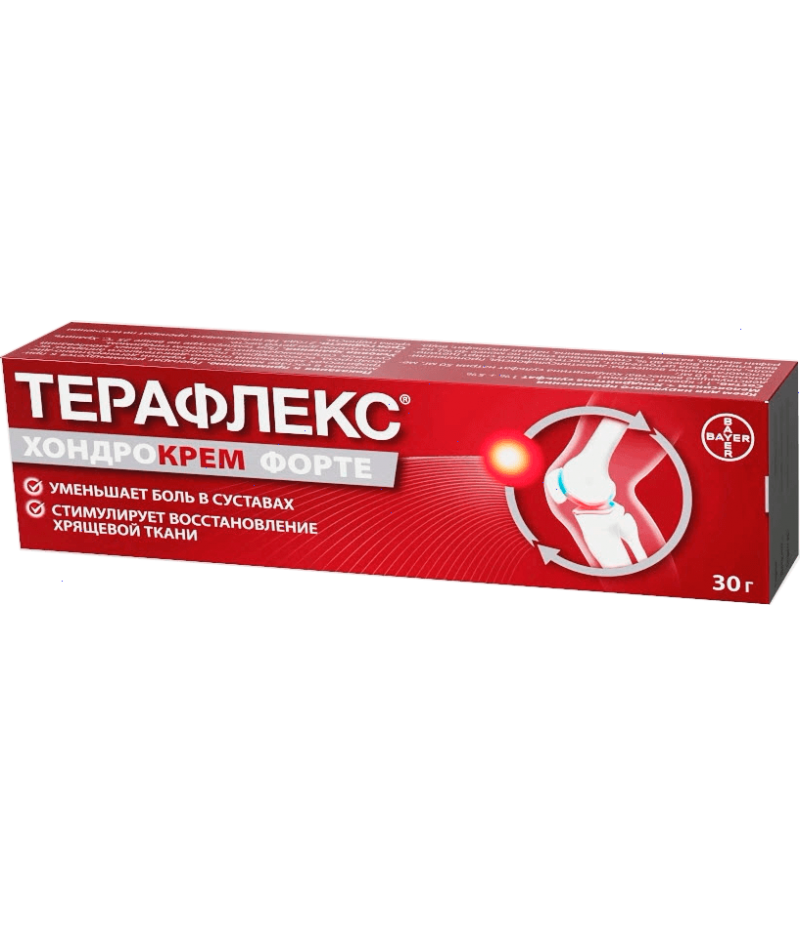Theraflex Advance caps #60
- $52.39
- 2 or more $51.60
- 3 or more $50.90
- Availability:In Stock
Theraflex Advance instructionYou can buy Theraflex Advance onlineSee also - TheraflexComposition1 capsule of the drug consists of: glucosamine sulfate 250 mg, chondroitin sulfate 200 mg, ibuprofen 100 mg; additional substances: co..
Tags: caps
Theraflex Advance instruction
You can buy Theraflex Advance online
See also - Theraflex
Composition
1 capsule of the drug consists of: glucosamine sulfate 250 mg, chondroitin sulfate 200 mg, ibuprofen 100 mg; additional substances: corn starch, cellulose, sodium carboxymethyl starch, stearic acid, crospovidone, silicon dioxide, magnesium stearate, povidone.
In the capsules gelatinous: gelatin, titanium dioxide, dye blue.
Form of issue
Capsules gelatinous, with a lid of blue color and white case, inside - a white powder. Capsules of 30, 60 or 100 pcs. in polyethylene bottles.
pharmachologic effect
Stimulates the restoration of cartilage, reduces inflammation.
Chondroitin sulfate is a substance involved in the formation of healthy cartilaginous tissue. At the same time, the viscosity of the synovial fluid is preserved, enzymes that destroy cartilage are inhibited. When osteoarthritis reduces the manifestations of the disease and helps reduce the dose of non-steroidal anti-inflammatory drugs.
Glucosamine sulfate improves the synthesis of substances that are the main components of cartilage, joints and synovial fluid.
Ibuprofen provides anti-inflammatory effect, reduces pain, has antipyretic effect due to blockade of cyclooxygenase-1 and cyclooxygenase-2.
Glucosamine and chondroitin increase the analgesic effect of ibuprofen.
Pharmacodynamics and pharmacokinetics
Bioavailability of glucosamine is about 25%, with the largest concentration of the substance in the cartilage of the joints, liver and kidneys, the highest concentration is found in the liver, kidneys and cartilage of the joints. Almost 30% of the substance is in the muscles and bones for a long time. Half-life - about 3 days, is excreted in the urine.
The bioavailability of chondroitin sulfate after absorption in the gastrointestinal tract is approximately 13%.
The maximum concentration occurs after 4 hours in the blood, and in the intra-articular fluid - within 5 hours. A large amount is contained in the synovial fluid. It is excreted from the body with urine.
After ingestion of ibuprofen, its maximum concentration occurs within 1 hour. It is capable of 99% binding to plasma proteins and penetrating into the intra-articular fluid. Metabolized in the liver, excreted by the kidneys. The half-life is about 3 hours.
Indications for use
osteochondrosis of the spine with a painful syndrome of moderate character;
osteoarthritis of large joints.
Contraindications
ulcerative lesions of the digestive tract (peptic ulcer, Crohn's disease, ulcerative colitis);
gastrointestinal bleeding;
intracranial hemorrhages;
bleeding disorders;
aspirin asthma;
hemorrhagic diathesis;
children under 12 years;
individual intolerance of the constituent components of the drug;
pregnancy and lactation;
hypersensitivity to aspirin and NSAIDs.
Assign cautiously in arterial hypertension, heart failure, severe damage to kidney and liver function, gastrointestinal diseases, hyperbilirubinemia, nephrotic syndrome, blood diseases, diabetes, bronchial asthma, in elderly patients.
In the case of intolerance to sea products, the likelihood of developing an allergy to the drug increases.
Side effects
There may be nausea, diarrhea, abdominal pain, flatulence, constipation and allergic reactions. In case of drug cancellation, side effects disappear.
Most adverse reactions occur on ibuprofen, which is part of the drug.
Digestive system: dry mouth, stomatitis, abdominal pain, heartburn, nausea and vomiting, flatulence, constipation and diarrhea, pancreatitis and hepatitis.
Respiratory system: bronchospasm and shortness of breath.
CNS: dizziness, headache, irritability, insomnia, drowsiness, depression, hallucinations and confusion.
Organs of the senses: changes in hearing (noise or ringing in the ears, hearing loss), dry eyes, double vision, eyelid edema and conjunctiva.
Heart and blood vessels: heart palpitations, increased blood pressure, heart failure.
Urinary system: nephrotic syndrome, cystitis, nephritis, acute renal failure.
The hemopoietic system: thrombocytopenia, anemia, leukopenia, thrombocytopenic purpura, an increase in the duration of bleeding.
Allergic reactions: erythematous rash, skin itching, urticaria, anaphylactic shock, Quincke's edema, bronchospasm, exudative erythema multiforme, Lyell syndrome, allergic rhinitis, eosinophilia.
Instructions for use Theraflex Advance (Method and dosage)
Take three times a day for 2 capsules after meals, washed down with water in small amounts.
Instructions for Theraflex Advance recommends that the treatment should not be more than 3 weeks without consulting a specialist.
Overdose
Symptoms are mainly associated with ibuprofen: abdominal pain, nausea, headache, vomiting, arterial hypotension, drowsiness, retardation, tinnitus, renal failure, metabolic acidosis, frequent or slow heartbeat.
For treatment, gastric lavage, activated charcoal, alkaline drink, symptomatic therapy are used.
Interaction
Ethanol, tricyclic antidepressants, rifampicin, barbiturates in joint admission increase the risk of liver damage.
Theraflex Advance is able to reduce the effect of antihypertensive drugs (ACE inhibitors and calcium channel blockers), furosemide, hydrochlorothiazide and uricosuric agents.
The drug enhances the effects of antiaggregants, anticoagulants and fibrinolytics, thereby increasing the risk of bleeding.
Potentiates side effects of drugs that have a ulcerogenic effect - NSAIDs, ethanol, estrogens, GCS.
Antacid drugs reduce the absorption of ibuprofen.
Theraflex Advance increases the effect of insulin and other hypoglycemic drugs, increases the concentration of cardiac glycosides, methotrexate and lithium-containing drugs in the blood.
The analgesic effect of the drug may be increased by caffeine.
Ibuprofen reduces the anti-inflammatory and antiplatelet effect of aspirin.
Cefoperazone, cefamandol, valproic acid, plikamycin, cefotetan increase the risk of hypoprothrombinemia.
Joint use with myelotoxic drugs increases the toxic effect on the blood system.
Admission with gold preparations and cyclosporine increases nephrotoxicity and hepatotoxicity.
Glucosamine can reduce the effect of doxorubicin, hypoglycemic drugs, teniposide, chloramphenicol, semisynthetic penicillins and increase the absorption of tetracyclines.
Storage conditions
Away from children and at a temperature of no higher than 25 ° C.
Shelf life - 2 years.
special instructions
In case of necessity of long reception of a preparation, it is necessary to control blood and kidney and liver functions.
In case of symptoms of gastropathy, examination is necessary to avoid the formation of ulcers and bleeding.
If you need to use other analgesics and NSAIDs, remember that the ibuprofen is part of the drug.
What is the difference between Theraflex and Theraflex Advance?
Theraflex Advance additionally with ibuprofen.
Children
Contraindicated in children under 12 years.
In pregnancy and lactation
The use is contraindicated.
Reviews of Theraflex Advance
Patients respond to the drug as a remedy that has an effect in the case of prolonged use. The disadvantage is the presence of side effects from the gastrointestinal tract in the form of pains in the stomach and exacerbations of gastritis and ulcers.
The comments of the doctors who use Theraflex Advance in their practice refer to the convenience of application for the treatment of joint damage - in one capsule there is both NSAIDs and substances that repair cartilage tissue.

